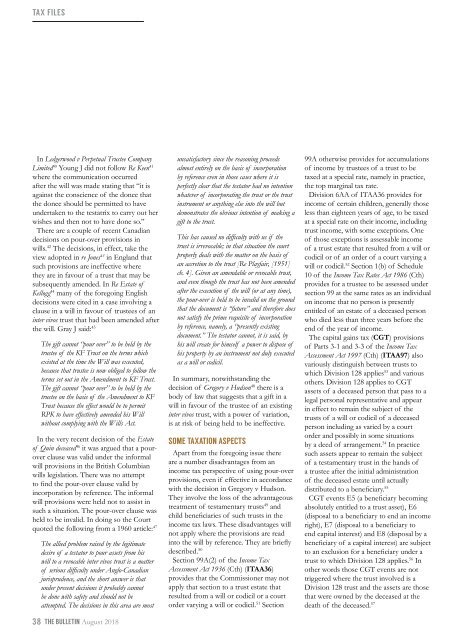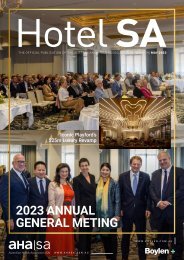The Bulletin August 2018
You also want an ePaper? Increase the reach of your titles
YUMPU automatically turns print PDFs into web optimized ePapers that Google loves.
TAX FILES<br />
In Ledgerwood v Perpetual Trustee Company<br />
Limited 40 Young J did not follow Re Keen 41<br />
where the communication occurred<br />
after the will was made stating that “it is<br />
against the conscience of the donee that<br />
the donee should be permitted to have<br />
undertaken to the testatrix to carry out her<br />
wishes and then not to have done so.”<br />
<strong>The</strong>re are a couple of recent Canadian<br />
decisions on pour-over provisions in<br />
wills. 42 <strong>The</strong> decisions, in effect, take the<br />
view adopted in re Jones 43 in England that<br />
such provisions are ineffective where<br />
they are in favour of a trust that may be<br />
subsequently amended. In Re Estate of<br />
Kellogg 44 many of the foregoing English<br />
decisions were cited in a case involving a<br />
clause in a will in favour of trustees of an<br />
inter vivos trust that had been amended after<br />
the will. Gray J said: 45<br />
<strong>The</strong> gift cannot “pour over” to be held by the<br />
trustee of the KF Trust on the terms which<br />
existed at the time the Will was executed,<br />
because that trustee is now obliged to follow the<br />
terms set out in the Amendment to KF Trust.<br />
<strong>The</strong> gift cannot “pour over” to be held by the<br />
trustee on the basis of the Amendment to KF<br />
Trust because the effect would be to permit<br />
RPK to have effectively amended his Will<br />
without complying with the Wills Act.<br />
In the very recent decision of the Estate<br />
of Quin deceased 46 it was argued that a pourover<br />
clause was valid under the informal<br />
will provisions in the British Columbian<br />
wills legislation. <strong>The</strong>re was no attempt<br />
to find the pour-over clause valid by<br />
incorporation by reference. <strong>The</strong> informal<br />
will provisions were held not to assist in<br />
such a situation. <strong>The</strong> pour-over clause was<br />
held to be invalid. In doing so the Court<br />
quoted the following from a 1960 article: 47<br />
<strong>The</strong> allied problem raised by the legitimate<br />
desire of a testator to pour assets from his<br />
will to a revocable inter vivos trust is a matter<br />
of serious difficulty under Anglo-Canadian<br />
jurisprudence, and the short answer is that<br />
under present decisions it probably cannot<br />
be done with safety and should not be<br />
attempted. <strong>The</strong> decisions in this area are most<br />
38 THE BULLETIN <strong>August</strong> <strong>2018</strong><br />
unsatisfactory since the reasoning proceeds<br />
almost entirely on the basis of incorporation<br />
by reference even in those cases where it is<br />
perfectly clear that the testator had no intention<br />
whatever of incorporating the trust or the trust<br />
instrument or anything else into the will but<br />
demonstrates the obvious intention of making a<br />
gift to the trust.<br />
This has caused no difficulty with us if the<br />
trust is irrevocable; in that situation the court<br />
properly deals with the matter on the basis of<br />
an accretion to the trust [Re Playfair, [1951]<br />
ch. 4]. Given an amendable or revocable trust,<br />
and even though the trust has not been amended<br />
after the execution of the will (or at any time),<br />
the pour-over is held to be invalid on the ground<br />
that the document is “future” and therefore does<br />
not satisfy the prime requisite of incorporation<br />
by reference, namely, a “presently existing<br />
document.” <strong>The</strong> testator cannot, it is said, by<br />
his will create for himself a power to dispose of<br />
his property by an instrument not duly executed<br />
as a will or codicil.<br />
In summary, notwithstanding the<br />
decision of Gregory v Hudson 48 there is a<br />
body of law that suggests that a gift in a<br />
will in favour of the trustee of an existing<br />
inter vivos trust, with a power of variation,<br />
is at risk of being held to be ineffective.<br />
SOME TAXATION ASPECTS<br />
Apart from the foregoing issue there<br />
are a number disadvantages from an<br />
income tax perspective of using pour-over<br />
provisions, even if effective in accordance<br />
with the decision in Gregory v Hudson.<br />
<strong>The</strong>y involve the loss of the advantageous<br />
treatment of testamentary trusts 49 and<br />
child beneficiaries of such trusts in the<br />
income tax laws. <strong>The</strong>se disadvantages will<br />
not apply where the provisions are read<br />
into the will by reference. <strong>The</strong>y are briefly<br />
described. 50<br />
Section 99A(2) of the Income Tax<br />
Assessment Act 1936 (Cth) (ITAA36)<br />
provides that the Commissioner may not<br />
apply that section to a trust estate that<br />
resulted from a will or codicil or a court<br />
order varying a will or codicil. 51 Section<br />
99A otherwise provides for accumulations<br />
of income by trustees of a trust to be<br />
taxed at a special rate, namely in practice,<br />
the top marginal tax rate.<br />
Division 6AA of ITAA36 provides for<br />
income of certain children, generally those<br />
less than eighteen years of age, to be taxed<br />
at a special rate on their income, including<br />
trust income, with some exceptions. One<br />
of those exceptions is assessable income<br />
of a trust estate that resulted from a will or<br />
codicil or of an order of a court varying a<br />
will or codicil. 52 Section 1(b) of Schedule<br />
10 of the Income Tax Rates Act 1986 (Cth)<br />
provides for a trustee to be assessed under<br />
section 99 at the same rates as an individual<br />
on income that no person is presently<br />
entitled of an estate of a deceased person<br />
who died less than three years before the<br />
end of the year of income.<br />
<strong>The</strong> capital gains tax (CGT) provisions<br />
of Parts 3-1 and 3-3 of the Income Tax<br />
Assessment Act 1997 (Cth) (ITAA97) also<br />
variously distinguish between trusts to<br />
which Division 128 applies 53 and various<br />
others. Division 128 applies to CGT<br />
assets of a deceased person that pass to a<br />
legal personal representative and appear<br />
in effect to remain the subject of the<br />
trusts of a will or codicil of a deceased<br />
person including as varied by a court<br />
order and possibly in some situations<br />
by a deed of arrangement. 54 In practice<br />
such assets appear to remain the subject<br />
of a testamentary trust in the hands of<br />
a trustee after the initial administration<br />
of the deceased estate until actually<br />
distributed to a beneficiary. 55<br />
CGT events E5 (a beneficiary becoming<br />
absolutely entitled to a trust asset), E6<br />
(disposal to a beneficiary to end an income<br />
right), E7 (disposal to a beneficiary to<br />
end capital interest) and E8 (disposal by a<br />
beneficiary of a capital interest) are subject<br />
to an exclusion for a beneficiary under a<br />
trust to which Division 128 applies. 56 In<br />
other words those CGT events are not<br />
triggered where the trust involved is a<br />
Division 128 trust and the assets are those<br />
that were owned by the deceased at the<br />
death of the deceased. 57


















